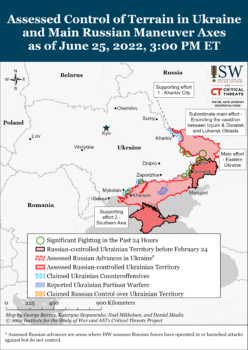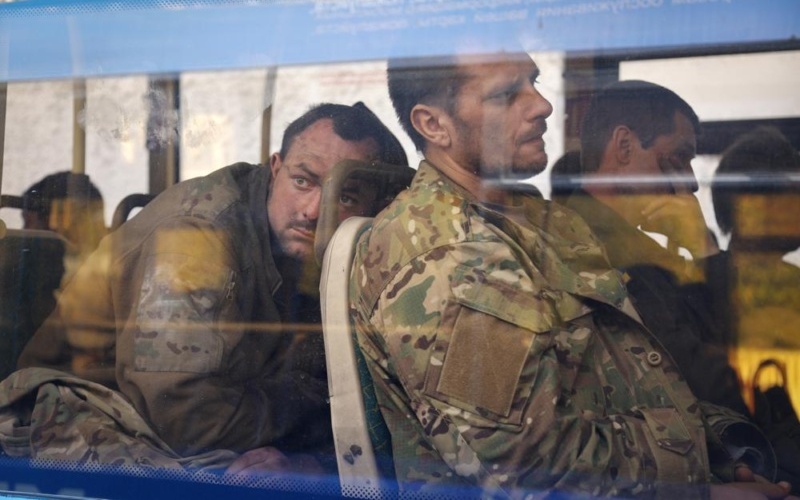Ukrainian POWs are taken from Mariupol in southern Ukraine to the Russian proxy area of Donetsk in the east, May 17, 2022 (Alexei Alexandrov/AP)
“Ukraine Remains Defiant”: What’s Next in Putin’s War
Saturday’s Coverage: Retreating Russia Kills 21 of Odesa’s Civilians

Source: Institute for the Study of War
UPDATE 1657 GMT:
Prime Minister Anthony Albanese has announced that Australia will provide an additional 14 armored personnel carriers, 20 Bushmaster vehicles, and drones to Ukraine.
Speaking at a press conference in Kyiv alongside Ukraine President Volodymyr Zelenskiy, Albanese said Australia will impose sanctions and travel bans on 16 more Russian ministers and oligarchs, bringing the total number of Russian individuals sanctioned by Australia to 843, and will prohibit imports of Russian gold.
The Prime Minister paid tribute to the “courage, resilience, bravery and determination” of Zelenskiy and Ukraine’s military and its people, saying they were “determined to stand up to a bully which is breaching international law without any provocation or any excuse”.
Before the Kyiv meeting, Albanese toured the nearby towns of Bucha, Irpin, and Hostomel, where occupying Russian forces carried out mass killings of civilians and other war crimes in February and March.
UPDATE 1647 GMT:
Turkish customs authorities have detained a Russian cargo ship carrying grain from Russian-occupied Berdyansk in southern Ukraine.
Ukraine’s Ambassador to Turkey, Vasyl Bodnar, said, “We have full co-operation. The ship is currently standing at the entrance to the port, it has been detained by the customs authorities.”
Russian occupation official Yevgeny Balitsky said on Thursday that the first grain from Berdyansk, a port city in southern Ukraine, was being shipped. He said a vessel was taking 7,000 tons of grain to “friendly countries”.
On Friday, Ukraine’s Prosecutor General wrote Turkey’s Justice Ministry that the ship Zhibek Zholy, en route to the port of Karasu, is part of the “illegal export of Ukrainian grain” from the Russian-occupied port of Berdyansk.
1352 GMT::
The US-based Institute for the Study of War assesses that “Ukrainian forces likely conducted a deliberate withdrawal [on Saturday] from Lysychansk”, the last Ukraine-held city in the Luhansk oblast in the east of the country.
The Institute cites footage showing Russian forces casually walking around northern and southeastern neighborhoods in the city.
The Ukrainian forces may have pulled out before they were surrounded. Russian proxy officials claimed on Saturday that the encirclement had been completed, a claim denied by Ukraine’s military and regional officials.
Residents said most Ukrainian forces in the city pulled out on Friday, bolstering defenses along the border with the neighboring Donetsk oblast. Ukrainian troops repulsed an attempt by Russian forces to cut the last road out of Lysychansk, near the village of Verkhnokamianske.
The residents said the only town in Luhansk still in Ukrainian hands is Bilohorivka, further north.
Ukraine Internal Affairs Minister Vadym Denysenko acknowledged Russian forces have a “high probability” of capturing Lysychansk, but said they will have a difficult time advancing in the neighboring Donetsk oblast past Slovyansk and Kramatorsk.
Oleksiy Arestovych, an advisor to President Zelenskiy, said on Sunday that Russian forces had crossed the Siverskiy Donets River and were approaching Lysychansk from the north.
This is indeed a threat. We shall see,” he said. “I do not rule out any one of a number of outcomes here. Things will become much more clear within a day or two.
Luhansk Governor Serhiy Haidai wrote on Telegram, “The occupiers threw all their forces on Lysychansk. They attacked the city with incomprehensibly cruel tactics.”
UPDATE 1322 GMT:
At least six people have been killed and 15 wounded by Russian attacks on the city of Slovyansk in the Donetsk oblast in eastern Ukraine.
Mayor Vadym Lyakh said the shelling, the worst to hit the city recently, set almost 15 fires.
Slovyansk is a likely target for a Russian ground assault after the fall of Lysychansk, 70 km (43 miles) to the east in the Luhansk oblast, this weekend (see above).
Kramatorsk is also being shelled on Sunday.
UPDATE 1042 GMT:
Ukrainian forces have struck one of four Russian military bases in occupied Meliotopol in southern Ukraine, says its exiled mayor Ivan Fedorov.
Fedorov said the base has been knocked out of action.
The Russian proxy administration of Melitopol, seized in the first days of Moscow’s invasion, acknowledged the attack. It said several houses near the airfield were damaged.
UPDATE 0759 GMT:
The head of the Russian proxy “Donetsk People’s Republic” is continuing Moscow’s de facto annexation of the area in eastern Ukraine.
Having replaced his top advisors with former Russian ministers, Denis Pushilin announced on Saturday that he replaced another four public administration officials with “experienced” Russians to institute the “Russian paradigm of public administration.”
UPDATE 0742 GMT:
The governor of the Belgorod region in Russia claims at least six people, including a child and three displaced Ukrainians, were killed and 15 injured by blasts on Sunday.
Vyacheslav Gladkov said at least 11 apartment buildings and 39 private residential houses were damaged, with five houses destroyed. He wrote, “Reasons for the incident are being investigated. Presumably, the air defence system worked.”
Ukraine Interior Ministry advisor Anton Gerashchenko said he believed Russia carried out the strike for its propaganda.
UPDATE 0727 GMT:
In his nightly video address to the nation, Ukrainian President Volodymyr Zelenskiy has welcomed Monday’s international conference in Lugano, Switzerland, discussing the reconstruction of Ukraine.
It is necessary not only to restore everything that the occupiers destroyed, but also to create a new basis for our life, for Ukraine — safe, modern, convenient, barrier-free. This requires colossal investments — billions, new technologies, best practices, new institutions and, of course, reforms….
Although a lot still needs to be done for our victory – and it is a difficult path, because the war continues – but already now we must do everything possible so that the aggressor loses not only on the battlefield, but also historically, conceptually…so that everyone in Russia remembers that Ukraine cannot be broken by anything, by anyone, even by a brutal war.
ORIGINAL ENTRY: Former Ukrainian prisoners of war have spoken of their abuse and torture by Russian captors.
The testimony comes from six former POWs and their families who spoke to The Hill. Their accounts include prisoners beaten to death; fingers mangled by metal tools; women forced to pose naked for photographs and to hold their hands above their heads or be beaten; and hospitalized POWs mocked, threatened, and left to die.
Thousands of Ukrainians, military and civilians, have been detained since Russia’s invasion on February 24. Some have been exchanged, but others face show trials with the prospect of long sentences and even execution.
Mangling Fingers
Igor Kurayan, 55, joined the Ukrainian military at the start of the invasion and was captured in April.
When Russian troops discovered that he had moved supplies to Ukrainian forces since 2014, they accused him of financing terrorist organizations and preparing a terrorist attack.
For weeks, Kurayan was beaten and electrocuted in attempts to extract information from him. His fingers were twisted and cut using pliers and metal scissors. Other prisoners were beaten to death.
Russian forces used Kurayan’s phone to take over his social media accounts. They captioned his photos with Ukrainian forces to make it appear that he was calling for them to surrender to Russia.
Electrocuted and Photographed Naked in Russia
Anzhelika Todorashko, 32, testified about the detention of her mother when Russian forces occupied her small village near the border, cut off supplies, and told residents to take a bus to a “filtration camp” to Russia.
Her 52-year-old mother Viktoria, who worked with the army, was transported to Russia where she was electrocuted, photographed naked, and given little food and water. She heard screams from other prisoners asking for death.
Her mother said prisoners had to hold their hands above their head for hours each day. They were beaten when the hands dropped. Women had their shaved and were suffocated by soldiers in masks.
Viktoria was released after weeks in imprisonment and taken to a Ukrainian hospital.But Todorashko’s sister Valeria was seized in March for 10 days. She was released when Russia could not find any evidence of activities with Ukraine’s military.
Todorashko was unaware that her mother was captured until Viktoria was released and able to contact her. She only learned of her sister’s captivity because her younger brother was able to hide a phone and message her.
“It was terrifying,” she recalled.
Taunted in a Mariupol Hospital
Hlib Stryszko, 25, was defending a bomb shelter in the port city of Mariupol in southern Ukraine, protecting women and children. He fell from a third-floor balcony when a Russian tank fired at him, and was hospitalized with a broken pelvis and injuries to his eyes and jaw.
Two days later Russian forces occupied the hospital and transferred him to another hospital where doctors refused to treat anyone speaking Ukrainian. He was there about a week with little treatment, a translator explained: “They were kind of sarcastically coming up to him every morning, saying ‘Hey, hang in there soldier, maybe something will come up for you.’”
Music was blasted as wounded soldiers, and Chechen fighters taunted them, grazing their knives on the bodies of the injured.
Stryszko was transported to Russia, but could not be imprisoned because of his injuries. He was taken to Russian-occupied Crimea, exchanged, and brought to a Ukrainian hospital.
“What Are You Fighting For? What Are You Living For?
Volodymyr Balukh, 51, defied the Russians when Crimea was occupied in 2014. He refused to obey orders by soldiers, continued to fly his Ukrainian flag, and switched from speaking Russian to Ukrainian.
Balukh was arrested multiple times for running food and supplies to Ukrainian soldiers on the frontlines. He was imprisoned between 2016 and 2019, after the Russians planted ammunition and explosives at his house to seize him as a “terrorist”.
Balukh says Russian soldiers waterboarded him, stripped him naked, electrocuted him, threatened him with rape, and gave him limited food.
He says today, “Endurance, faith and steadfastness are very important in captivity. It’s important to know, what are you fighting for? What are you living for?”

